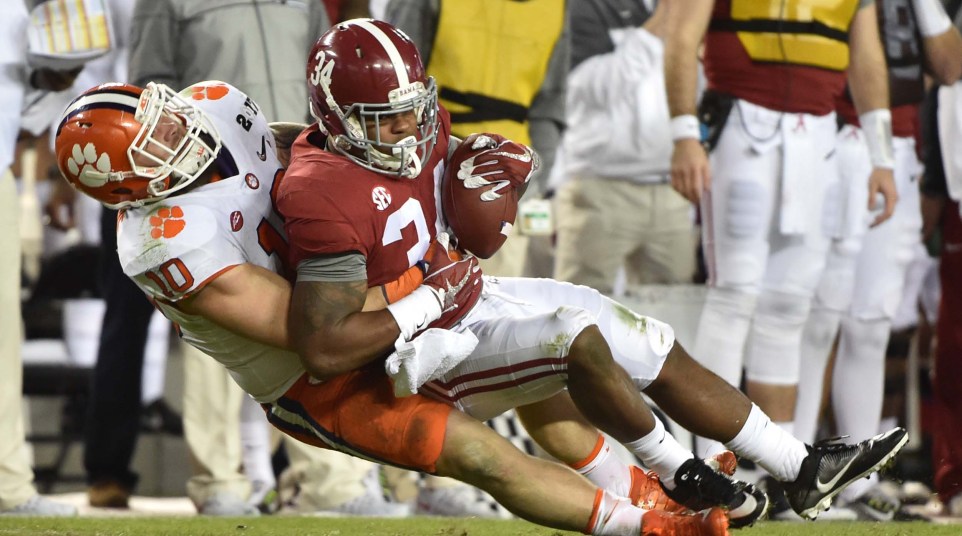
If Alabama does not win the College Football Playoff, expect the 'dynasty is over' talk to be rampant
Alabama reached the College Football Playoff as the No. 4 seed. One can debate whether the Crimson Tide got there in 2017 by merit or accrued reputation. Nonetheless, Alabama is the only team to reach the Playoff each season of its existence. This should testify to Nick Saban’s greatness. But, coming just short again could indicate a small, but significant decline.
Not winning this year’s Playoff would mean Alabama triumphed just once in four opportunities. It would mean the Crimson Tide, chalk favorites entering each season, had won only one national title in the past five years. Saban could lose to Dabo Swinney again. He could lose to his protege Kirby Smart. He could lose to Lincoln Riley, a millennial in his first year as a head coach. Oh, and don’t forget this would happen right after closing the season with Iron Bowl loss by double digits.
Hot seat talk would be asinine. Saban is not destined for a statue in Tuscaloosa. He warranted building one in 2011. His $65 million contract runs through 2025. Firing him without cause could cost $27 million. But it’s easy to see a narrative turn if the Tide do not win this year. Unlike past offseasons, the “Alabama’s dynasty is over” would have some grounding and at least be more than vacant trolling.
Saban’s teams are not dominating the Playoff the way they did during the BCS. The Crimson Tide went to three national title games in four years from 2009-12. They not only won all three games, but they clobbered opponents in the process. The closest game was the 16-point win over Texas. Alabama covered the point spreads by an average point margin of (+16.2). Flip a couple of weird Iron Bowl plays. Nick Saban could have won five titles in a row.
Alabama’s postseason fortunes have taken a different turn since that four-year stretch. The Crimson Tide are just 3-3 overall and 2-4 against the spread in their past six postseason games. Their only covers came against overmatched Michigan State and Washington teams who were double-digit underdogs. Is that a decline? It’s hard to tell.
The format changed on Alabama. The Playoff is harder to win than the BCS. Injuries pile up with the extra game. Unlike the BCS, the Playoff requires a champion to beat the next best opponent. With just two teams making it and a heavier emphasis on W-L record under the BCS, that wasn’t always the case. Alabama played 12-0 Notre Dame instead of a superior 11-1 Oregon in 2012. Had Ohio State not faced a postseason ban, the Buckeyes and Notre Dame would have played for the title, despite both being worse than at least four SEC teams that year.
We don’t know what would have happened had the Playoff started earlier. We also don’t know what would have happened had the BCS stayed intact. In the 2014 season under the BCS, Alabama would have played a 13-0 Florida State in the final. That would be the Seminoles team with seven one-score wins that Oregon beat by 39 in the semifinal. Winning that might have made it five titles in eight years.
There has been a definite difference at a pivotal position: quarterback. A.J. McCarron was one of the nation’s most efficient passers in college. He almost never turned the ball over (only 15 interceptions in 40 starts). He played as well, if not better when it counted. Alabama has struggled to match that since.
Blake Sims did finish top 10 in passer rating in 2014. But when Alabama and Ohio State met in the Playoff, he threw three picks, a season’s worth of mistakes for McCarron, in a 42-35 loss. Jake Coker came on strong at the end of 2015. He didn’t throw a pick from the Iron Bowl forward. He averaged 13.5 yards/attempt in a final win over Clemson.
Jalen Hurts played well for a true freshman for most of the 2016 season. He then looked like a bog standard true freshman come Playoff time, averaging only 4.2 yards/attempt against Washington and Clemson. Hurts has improved as a sophomore, averaging 8.7 yards/attempt and throwing just one interception in 222 attempts. But Alabama never had him throw 25 times in any game this season. Hurts completed fewer than 60 percent of his passes against three ranked FBS opponents to end the year and managed only 5.1 yards/attempt in the Auburn loss.
Some teams get stuck playing young quarterbacks or stop gaps. Alabama had them playing ahead of multiple top recruits that, due to scouting, development, or fortune, never panned out.
“Decline” is a strong word. A few plays here or there could have changed outcomes and subsequent stories radically. But such fine margins lay the foundation of the sweeping narratives that sustain the sport through the off-months. If Alabama comes up short for the fourth time in five years, talking season could get interesting.
